

Our Kids' Connected Culture - Overview for Parents and Teachers.
Internet safety in emerging educational contexts. Volume 43, Issues 1–2, August–September 2004, Pages 193–204 21st Century Learning: Selected Contributions from the CAL 03 Conference Jocelyn Wishart, Department of Information Science, Loughborough University, Loughborough LE11 3TU, UK Available online 27 March 2004 Choose an option to locate/access this article: Check if you have access through your login credentials or your institution Check access.
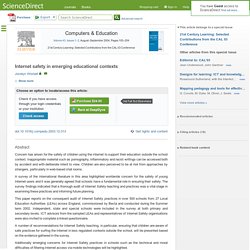
From the Editor: Internet Safety and Ethics. Note: After reading this editorial, please visit the transcript of the discussion forum to view readers' comments.
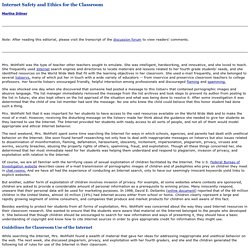
Mrs. Wohfiehl was the type of teacher other teachers sought to emulate. She was intelligent, hardworking, and innovative, and she loved to teach. She frequently used Internet search engines and directories to locate materials and lessons related to her fourth grade students' needs, and she identified resources on the World Wide Web that fit with the learning objectives in her classroom. She used e-mail frequently, and she belonged to several listservs, many of which put her in touch with a wide variety of educators -- from inservice and preservice classroom teachers to college professors. She was shocked one day when she discovered that someone had posted a message to this listserv that contained pornographic images and abusive language.
Mrs. The next weekend, Mrs. But another, subtler form of exploitation of children involves invasion of privacy. About the Author. Internet Safety Gone Wild? Safety in Cyberspace. Getting started – For families – Safety Center – Google. As a parent or guardian, you know what feels right for your family and how your kids learn best.
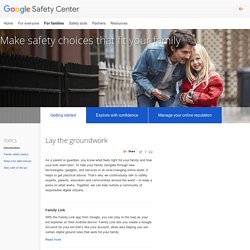
To help your family navigate through new technologies, gadgets, and services in an ever-changing online world, it helps to get practical advice. That’s why we continuously talk to safety experts, parents, educators and communities around the world – to keep a pulse on what works. Together, we can help nurture a community of responsible digital citizens. {*style:<ul>*} {*style:<li>*} {*style:<h3>*} Family Link {*style:</h3>*} {*style:<br>*} With the Family Link app from Google, you can stay in the loop as your kid explores on their Android device. Family Link lets you create a Google Account for your kid that’s like your account, while also helping you set certain digital ground rules that work for your family.
Empowering Students: Using Data to Transform a Bullying Prevention and Intervention Program - Professional School Counseling - Volume 12, Number 6 / August 2009 - American School Counselor Association. Journal Article Authors Anita Young, Ph.D., secondary school counseling specialist1, Valerie Hardy, M.Ed., lead counselor2, Christina Hamilton, M.Ed., middle school director of school counseling3, Kristen Biernesser, M.S.3, Li-Lin Sun, M.S.3, Susan Niebergall, M.S., middle school counselors3 1 Fairfax County, VA2middle school3 Fairfax County Abstract This article describes a middle school counseling department's journey and commitment to use data to seek more effective and efficient ways to provide comprehensive school counseling services to its diverse student population.
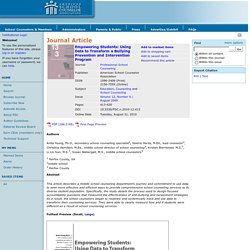
Fulltext Preview (Small, Large) Show References. Lessons Learned About Schools and Their Responsibility to Foster Safety Online - Journal of School Violence - Volume 2, Issue 1. Published online: 25 Sep 2008 Author affiliations.
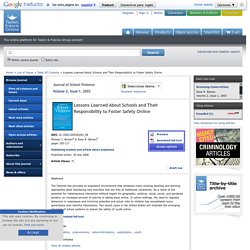
Cyberbullying: What School Administrators (and Parents) Can Do - The Clearing House: A Journal of Educational Strategies, Issues and Ideas - Volume 81, Issue 1. Recommended Practices: A Review of Schoolwide Preventative Programs and Strategies on Cyberbullying - Preventing School Failure: Alternative Education for Children and Youth - Volume 55, Issue 2. ContentServer 1. ED516936. School Climate 2.0: Preventing Cyberbullying and Sexting One Classroom at a Time - Sameer Hinduja, Justin W. Patchin. Internet Safety Hangman. Internet Safety Resources - help students stay safe online.
The Internet is an incredible thing - allowing us to communicate, connect, collaborate, learn and share with people all over the world.
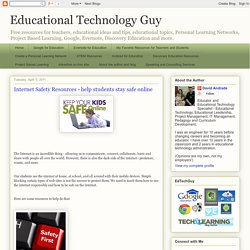
However, there is also the dark side of the internet - predators, scams, and more.Our students use the internet at home, at school, and all around with their mobile devices. Simply blocking certain types of web sites is not the answer to protect them. We need to teach them how to use the internet responsibly and how to be safe on the internet.Here are some resources to help do that: Make Use Of - 6 Internet Safety Games To Help Kids Become Cyber Smart Make Use Of, a great resource in itself, has listed 6 online safety games that help kids learn how to be safe and smart online.
These games are a great way to teach kids about internet safety.